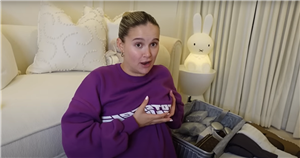If you love “Junebug,” the 2005 indie that launched Amy Adams’ career, then you probably felt at the time as film critic Jan Stuart did. He’s quoted on the poster as saying, “It is only a matter of time before [director] Phil Morrison achieves the status of Jim Jarmusch, Gus Van Sant, and Woody Allen.” Well, that prediction never really came to pass. Morrison made one more feature (forgettable), then turned his attention to commercials. Meanwhile, the film’s screenwriter, Angus MacLachlan, has slowly but surely emerged as an auteur of authentic stories representing the American South.
MacLachlan’s third film as director (and the first to be selected for Sundance featuring him in that role), “A Little Prayer” shares much of the sensibility — and sensitivity — that made “Junebug” so special. Once again, he’s written a modestly scaled but deep-reaching relationship drama about a white, middle-class North Carolina family that believes in God, grace and good manners. The Winston-Salem-set movie even shares a matriarch in Celia Weston’s Venida, though her on-screen husband’s the main character here. That would be David Strathairn, who embodies Bill, an upstanding army veteran with clear-cut ideas of right and wrong.
The same day MacLachlan’s story starts paying attention to these folks, Bill discovers that his adult son David (Bill Pullen) is having an affair with a secretary at the steel company he built from the ground up. Bill doesn’t mean to be nosey, but he adores his daughter-in-law Tammy — and with Jane Levy in that role, who wouldn’t? The “Zoey’s Extraordinary Playlist” star may not be the next Amy Adams, but she shares the capacity to play a guileless Southern gal (Tammy grew up in “the holler” and sports a slightly deeper drawl than her in-laws). From the opening scene, we’re instantly on her side, even though her marriage is more complicated than it looks.
Bill doesn’t butt in right away. But when David continues to flaunt the affair in front of everyone, Dad takes him aside and tells him to “straighten up and fly right.” It sounds like an order, and though Bill is both David’s boss and father, it’s the military commanding officer we hear when he says it. That dimension — plus the suggestion that David is dealing with some form of PTSD his dad can’t understand — enriches “A Little Prayer,” which is a story so small it could be contained in a teardrop, yet so pure, you’d swear it was a diamond you were gazing upon.
Churchgoing couple Bill and Venida believe in integrity, and they have raised their kids to share their same values, but culture is changing faster than either of them can understand. There’s a unmistakable weariness in Strathairn and Weston’s performances, as if their characters are winded by the world and not quite willing to concede that their adult children are now in charge of their own lives. David isn’t Bill’s only child, and the other — an independent-minded tornado of a woman named Patti (Anna Camp) — comes storming in a few scenes into the movie with her undisciplined young daughter Hadley (Billie Roy) in tow.
Like “You Can Count on Me” director Kenneth Lonergan, MacLachlan includes an element of humor in the way he observes the various people in his movie. But it’s his empathy that comes through. David’s workplace infatuation, Narcedalia (Dascha Polanco), is one of the film’s few non-white characters, and the director is sensitive enough to recognize that her experience of the affair is different from David’s. Off-camera from the start, a woman (Martha Bassett) can be heard singing spirituals early each morning, and the family members all look at this intrusion differently. Venida and Patti see it as a nuisance, while Bill and Tammy — both early birds — prefer it to the sound of an alarm clock or rooster, and even wish they could meet the woman responsible.
As in his earlier scripts, there’s a moral dimension to MacLachlan’s movies (the Martin Scorsese-produced “Abudnant Acreage Available” is worth tracking down in particular; Ramin Bahrani exec produced this one). But doing the right thing isn’t always as clear as it might seem, and here, intruding could make things worse. Outsiders may have opinions — audiences certainly will about a few of the more troubling things that happen here — but can’t know what truly goes on between a married couple. MacLachlan keeps whatever arguments or conversations pass between David and Tammy off-screen, focusing instead on the shorthand that exists between Bill and Venida, who’ve long since broken in their relationship.
There’s a terrific on the couch between the older couple in which both parties realize they’ve figured out something about Tammy that the other hasn’t picked up on. The two actors play their concern quite differently, but are clearly on the same wavelength. MacLachlan’s writing style is at once honest and slightly elevated, the kind we’re used to hearing on stage, where the structure of the entire script matters, and subtext is every bit as important as what’s spoken. Late in the film, David and Tammy share a poignant scene in which the latter, so understated until now, lets her father-in-law know why it’s been so difficult to leave his son. She shares her truth, as MacLachlan has the entire film, and we take it in, wanting to whisper a quiet “amen.”
Read More About:
Source: Read Full Article


